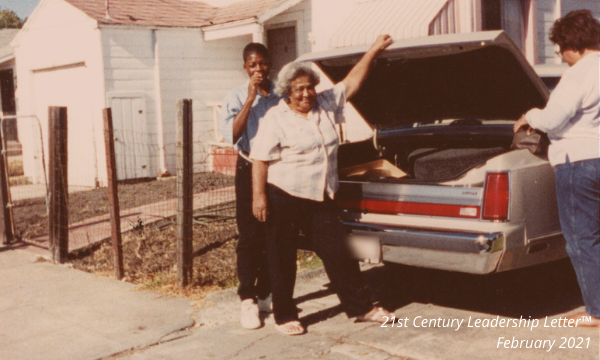It’s when my home state of Texas shows its multiple weather personalities as evidenced by the recent swing from 0° to 70° in a week’s span. I share this birth month with three of my family members, but it is also the time when I get energized by Black culture, history and storytelling. I want to take a moment to share with you one of my own origin stories—that of my first boss – and grandmother – Henretha Jones.
As Black History Month concludes, we’ve seen companies commemorate the accomplishments of Black Americans and take to social media making commitments to stand against racial injustice. Though the intent is appreciated, the Black community is still reeling from the pains and injustice from last year, and it begs that more needs to be done.
Diversity, equity, and inclusion made their way into the corporate lexicon years ago, but the urgency for immediate action intensified last year. The wick was ignited last Black History Month with the murder of Ahmaud Arbery for the crime of jogging followed by a succession of other racially charged incidents and murders, reaching a breaking point with the report of Amy Cooper calling the police and attempting to weaponize her whiteness to the potential demise of Christian Cooper; ending with the societal explosions that were the murders of George Floyd and Breonna Taylor.
These egregious racial injustices became the corporate altar call for leadership to invest in diversity, equity, and inclusion, exposing the disparity in power, privilege, and pay of Black leaders and employees in corporate America. Companies like Yum! Brands, Cisco, and General Motors stood up to pledge new efforts towards equity and racial justice. With all the commitments pledged and stances made – what has been done? What more can be done? What else is required to effect substantial change?
During this Black History Month, a time where we recognize the resilience, ingenuity, and beauty of the Black experience, we mark one year since Ahmaud Arbery’s death and in the same month, it’s been concluded that Amy Cooper’s charges have been dropped. It appears that the same injustices persist and the world has moved on along with organizational commitments.
How did Amy’s “restorative justice” happen so quickly while we still see slow change to the makeup of corporate boards, executive leadership, or company governance? Is it that brands believe since these charges have been dropped, and society has reset back to a toxic indifferent “normal”, that they are absolved from further responsibility?
This Black History Month, the world is reminding organizations of the diversity and inclusion commitments made last year – and we are obligated to respond.
Employees and leaders alike have called out “diversity fatigue,” stating their programs were becoming ineffective; even stating further tensions. This reduced efficacy can be ascribed to the very reason most DEI efforts fail – all the emphasis is placed on “talk” and less on actions, like addressing the systems and beliefs that create the disparities, and, most of all, accountability.
“Accountability creates leadership that treats inclusion as more than a line item.”
It’s not just consumers noticing silence in once boisterous brands, the employees notice. And with Glassdoor.com allowing its 50 million unique users to include gender and race in their employer ratings, organizations will need to not only continue but enhance their efforts. A key determining factor in an organization’s DEI success is action, and the principle that provides credibility via checks-and-balances is accountability. Companies that hold their leaders accountable ensure leadership is vigilant to the needs of their team and to any instances of exclusion that require addressing.
While others claim “diversity fatigue,” the Black community isn’t allowed the luxury of exhaustion. They have to fight – continuously, because this fight is continuous – and if a brand has committed to inclusion or any other “work” recently, then they must continue in the work as well. To quote Muhammad Ali:
“I don’t count my sit-ups. I only start counting when it starts hurting. When I feel pain, that’s when I start counting, because that’s when it really counts.”
Right now, it seems like it hurts, and it does, but the work we do right now is what matters.
Efforts like Black+ with Vice Media and Netflix shifting up to $100 million to directly serve the Black community are strong steps of progress we all want to see. Let’s celebrate and join them to multiply the results.






